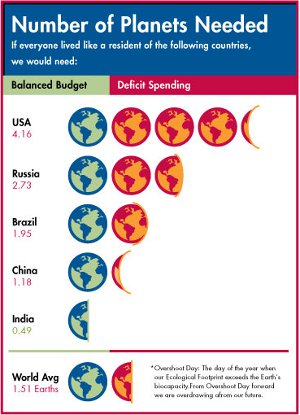Has humanity exhausted nature's budget for the year?
 Humanity has surpassed nature’ budget for the year, and is now operating in overdraft, according to data from Global Footprint Network.
Humanity has surpassed nature’ budget for the year, and is now operating in overdraft, according to data from Global Footprint Network.But it is possible to turn the tide and reverse current consumption trends to help close the ecological budget gap and provide for a prosperous future in the face of changing and challenging resource trends.
An international research organization with offices in California and Europe, Global Footprint Network measures humanity’s demand for and supply of natural resources and ecological services. Earth Overshoot Day, a concept originally developed by Global Footprint Network partner and UK think tank new economics foundation, is the annual marker of when we begin living beyond our means in a given year.
Global Footprint Network estimated that this year, it only took approximately 8 months to use up more renewable resources and CO2 sequestration than what the planet can sustainably provide for an entire year: ‘Earth Overshoot Day 2012’ happened on August 22. For the rest of the year, we will maintain our ecological deficit by depleting resource stocks and accumulating carbon dioxide in the atmosphere.
In 1992, Earth Overshoot Day-the approximate date our resource consumption for a given year exceeds the planet’s ability to replenish-fell on October 21. In 2002, Overshoot Day was on October 3 and last year, it was September 27. Given current trends in consumption, one thing is clear: Earth Overshoot Day tends to arrive earlier and earlier each year.
The fact that we are using, or “spending,” our natural capital faster than it can replenish is similar to having expenditures that continuously exceed income. In planetary terms, the costs of our ecological overspending are becoming more evident by the day.
Climate change-a result of greenhouse gases being emitted faster than they can be absorbed by forests and oceans-is the most obvious and arguably pressing result. But there are others-shrinking forests, species loss, fisheries collapse, higher commodity prices and civil unrest, to name a few.
“Nations around the world, and particularly in the south of Europe, have started to painfully experience what it means to spend more money than what they earn,” said Dr. Mathis Wackernagel, President of Global Footprint Network.
“The resource pressure is similar to such financial overspending, and can become devastating. As resource deficits get larger, and resource prices remain high, the costs to nations become unbearable.”
Our ecological overspending has become a vicious cycle, in which we draw down more and more principal at the same time our level of consumption grows. The social and economic costs could be staggering.
“From soaring fossil fuel prices to crippling national debts partly due to rising natural resource prices, our economies are now confronting the reality of years of spending beyond our means,” Dr. Wackernagel said.
“If we are to maintain stable societies and productive lives, we can no longer sustain a widening budget gap between what nature is able to provide and how much our infrastructure, economies and lifestyles require.”
 Today, humanity is using the equivalent of just over 1.5 Earth’s worth of ecological resources and services. If current trends continue unchanged, we are on track to require the resources of two planets well before mid-century.
Today, humanity is using the equivalent of just over 1.5 Earth’s worth of ecological resources and services. If current trends continue unchanged, we are on track to require the resources of two planets well before mid-century.China’s total ecological footprint-that is, its demand for natural resources and the services they provide-is the world’s largest, yet its per-person footprint remains modest. As its economy grows and its people prosper, China’s large population and increasing per-capita consumption will have an ever-greater impact on the world’s widening ecological deficit.
Already, we see how consumption patterns of individual countries grow global Overshoot: the per-capita resource demands of the United States, which went into Overshoot on March 28, are still equivalent to the supply of more than four Earths. The per-capita demands of Brazil, which went into Overshoot on July 6, require the resources of just under two Earths. In Qatar, the typical citizen requires the resources of six and a half Earths.
But it is not all doom and gloom. It is possible to turn the tide and reverse current consumption trends.
Global Footprint Network and its network of partners are working with organizations, governments and financial institutions around the globe to make decisions that are aligned with ecological reality-decisions that can help close the ecological budget gap and provide for a prosperous future in the face of changing and challenging resource trends.
“Now is the time to come up with ways of running our economies that will continue to work into the future,” Dr. Wackernagel said. “Long-term recovery will only succeed if it occurs along with systematic reductions to our demand on resources and ecosystem services.”
You can return to the main Market News page, or press the Back button on your browser.

